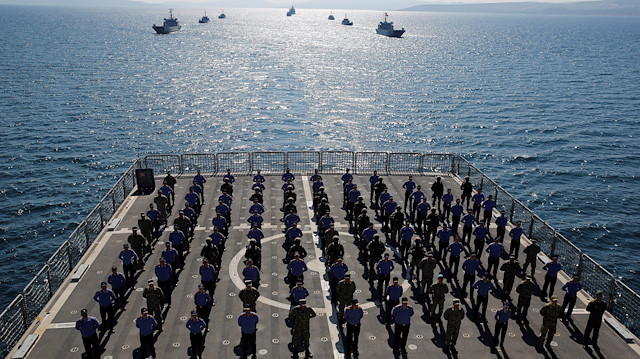
Maritime pact with Libya should be seen as part of Turkish drilling activities in region, says communications chief
Foreign remarks on Turkey’s recent maritime deal with the UN-recognized government of Libya will not prevent Turkish government from pursuing its own agenda in the Eastern Mediterranean, country's communications director said on Saturday.
Fahrettin Altun issued an article on micro blogging platform Medium where he discussed Turkey-Libya maritime jurisdiction pact and how it confirms the sovereignty of Turkey in the region.
Altun said the maritime pact demonstrated that Ankara administration would never turn a blind eye to any fait-accompli in the Eastern Mediterranean, and it ensured that Turkey was an actor that should not be denied.
Emphasizing that Turkey had long been busy dealing with its domestic affairs that hindered producing regional political policies, Altun argued this was no longer the case as Ankara, with its political and historical responsibilities, could not be a bystander watching regional incidents without intervening.
Turkey will not allow any violations in the Eastern Mediterranean as well as conduct of operations near its southern borders, he said, referring to the YPG/PKK terror group’s occupation in northern Syria.
He added that it was not surprising how some countries were disturbed by Turkey’s legitimate policies, stating that the Greek Cypriot administration, Greece, Egypt, and Israel had not favored Turkish policies in the region.
The communications director stressed that Egypt, Russia and the United Arab Emirates (UAE) supported commander Khalifa Haftar in Libya in violation of the UN resolutions while Turkey took a stance with the regional peace.
He added that Turkey’s maritime pact with Libya should be viewed as part of Turkish seismic and drilling activities in the Eastern Mediterranean, and nobody could isolate Turkey in the region.
Signed on Nov. 27, the memorandum determining both countries' marine jurisdictions rejects unilateral and illegal activities by other regional countries and international firms and aims to protect the rights of both countries.
According to the U.S. Geological Survey, the Mediterranean region is estimated to boast millions of barrels of oil and trillions of cubic meters of natural gas, worth hundreds of billions of dollars.
Tensions escalated in the Eastern Mediterranean region following the discoveries of natural sources with regional countries attempting to confine Turkey to southern Antalya Cove.
Turkey, for its part, has urged regional countries to take an equality-based approach, but its calls have largely fallen on deaf ears. Turkey continues its drilling and discovery operations in the region under the protection of the country's navy.
Since 2011, when longtime ruler Muammar Gaddafi was ousted and killed, Libya has seen the emergence of two rival seats of power: one in eastern Libya, to which military commander Khalifa Haftar is affiliated, and the Government of National Accord, which enjoys UN recognition.
Hello, the comments you share on our site are a valuable resource for other users. Please respect other users and different opinions. Do not use rude, offensive, derogatory, or discriminatory language.
The floor is all yours.








